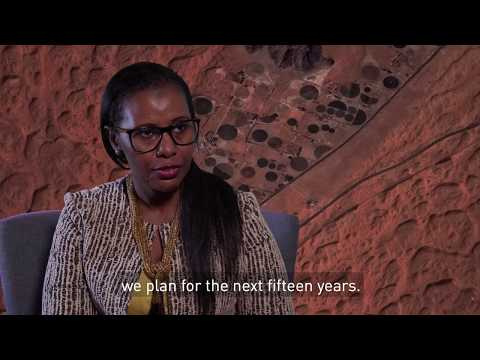Interview with Ayan Mahamoud, the Climate Security Expert & Senior Programme Coordinator at IGAD

Ayan Mahamoud (PhD) works for the Inter-Governmental Authority on Development (IGAD), a Regional Economic Community of the African Union. She was the IGAD Drought Disaster Resilience and Sustainability Initiative (IDDRSI) Coordinator for Regional Programming between 2014 and 2017. As part of her work, she coordinated and facilitated regional programming tasks within IDDRSI, a 15-year, over $700 Million, 8 country regional programme and the associated national programmes. She successfully facilitated bilateral and multi-lateral cross border cooperation agreements on drought resilience initiatives among the 8 IGAD Member States. She currently manages the USAID Programme Portfolio at IGAD and deals with issues related to Resilience/Climate Adaptation/Dryland Development, Cross-Border Health, Countering Violent Extremism and Conflict Prevention/Early Warning.
Could you tell us a little about IGAD and the work it does?
IGAD’s precursor was set up in 1986 to tackle the recurring issues of drought, desertification and conflict in the horn of Africa using a regional approach. Most of the time when there is drought or a conflict over natural resources, this results in cross border displacement, which significantly complicates the issue and requires a regional approach to address the dynamics. In fact, IGAD was an organisation working on climate security before it was formally named. The organisation has always received a lot of support from European donors and other donors such as the US government, the World Bank and the African Development Bank.
What projects have you undertaken?
I’ve been involved in many programmes across the region. IGAD tries to be holistic in its programming. For example, a cross border programme set up in 2014 between Kenya, Ethiopia, South Sudan and Uganda is now entering its seventh year of implementation with support from the World Bank. Like many IGAD programmes, it begins with an early warning. The goal is to inform pastoralists when drought, extreme temperatures or rain is expected. Help is then provided to prepare an emergency response, for example, providing feed for livestock. We also have early warning conflict monitoring teams that provide alerts when there is conflict or displacement, which are then correlated with weather data to provide additional insight. When cross border action is necessary this is done in collaboration with governments. Often this takes the form of reaching out to community leaders and fostering dialogue to facilitate understanding between groups.
Can you give us an example of a time when the work of IGAD has likely prevented conflict?
Some of the cross-border peace agreements in the Greater Karamoja Cluster helped to diffuse a fraught situation. During a drought in 2017, Turkana pastoralists in Kenya suffering drought were allowed to use Karamoja pastoralist land in Uganda without conflict. Of course, you can never prove that you have prevented a conflict, but it is very likely that in this case we reduced tension in the Karamoja region which could have erupted into violence.
Do you share your experiences with other organisations?
Yes. We cooperate with the Economic Community of West African States (ECOWAS) and the Permanent Interstate Committee for Drought Control in the Sahel (CILSS). These cooperative projects include conflict prevention and resilience programmes in the Sahel, and having early warning network setups that allow early detection and resolution of conflict – this is much easier than letting matters spiral out of control. These programmes find success in promoting the mobility and drought resilience of pastoralists in the region.
How can these issues be solved in the long term?
Climate security is a complex, multifaceted issue. There needs to be more aware of the reciprocal relationship between climate vulnerability and conflict. In general, there must be more dialogue and all actors must be brought together for consultation in every given situation which may have a bearing on climate security. For example, the focus on building natural resource infrastructure in Africa (like dams) is often done without conflict sensitivity. Conflict sensitivity is key to making sure that these sorts of undertakings do not worsen it. IGAD has developed these tools and rolled them out in the organisation. Others should take note. Increasingly there is also a role for the armed forces to include climate-sensitive programming in peacekeeping missions.
Interview with adelphi during the Planetary Security Conference 2017.
How is the security sector engaged, what should be done? Who can reach the security sector?
The security sector is crucial in addressing this issue, as there needs to be a level of conventional security for climate security work to start. For example, when security forces took over areas in Somalia from Al Shabab, the terrorist group moved to block access to water sources, decreasing local climate resilience. It is necessary for the military to work together with other organisations to provide both security and climate security initiatives. IGAD tries to access the security sector through their respective national governments, on which we have had some success. However, there is still more awareness of climate security required. The UN system must also play a part by being a good example to others.
What are the skills needed and the background required to work in this area?
It is essential that you understand both climate change and conflict. But it is especially important to understand social-demographic situations on the ground; a holistic understanding is essential. Something like International Relations studies may be a good background to enter the area with. Come with an open mind. The key thing is the ability to listen to the people you’re trying to help. You can’t sit in your office and think you know better than the person you’re trying to help. There are many dimensions to climate security, but in my view the ability to listen and engage in open dialogue with the community is the crucial thing.
This article was originally published on planetarysecurityinitiative.org.










